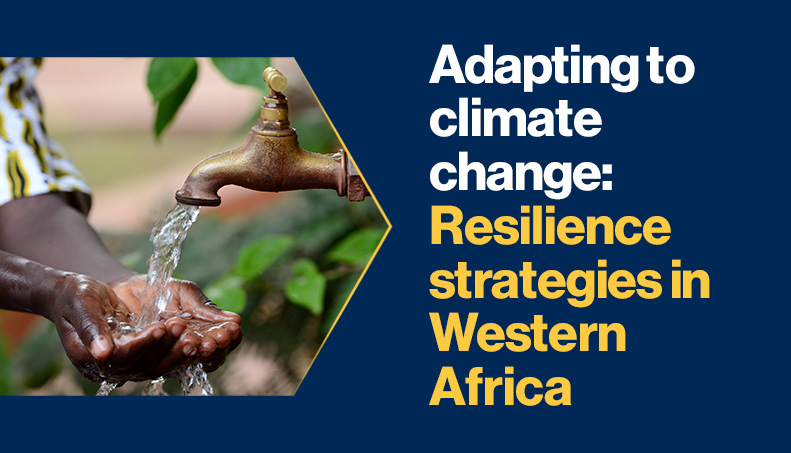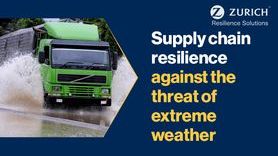Adapting to climate change: Resilience strategies in Western Africa

Climate risk in Western Africa presents many challenges to resilience and business continuity professionals in the region. In recent times, the topic has increased in visibility with a rise in the number and intensity of disasters putting pressure on a young industry.
Climate threats in Western Africa
Climate risks affecting Africa include drought, rising temperatures, and desertification such as in the Sahel region, which spans Western Africa. This region is facing significant desertification, driven by climate change and unsustainable land use practices. This has led to the loss of arable land, threatening livelihoods and exacerbating conflicts over scarce resources. On the other hand, rising sea levels and unpredictable storms have caused extreme flooding. Over the current year, in Nigeria, 29 out of 36 states have experienced torrential rain and floods that have led to overflowing dams and deluges of flood water from the Niger and Benue Rivers.
Chapter leader Tunde Dada said:
“One of the most glaring climate challenges in West Africa is flooding. This is a real and existing issue within the West Africa region and has already claimed many lives this year.”
To add to the current difficulties in the region, climate-related events are expected to increase in frequency and intensity.
Vice leader Yahya Jammeh added:
“Western Africa, like the broader Sub-Saharan region, faces significant climate challenges that are expected to intensify in the future. This is a concern for all business continuity and resilience practitioners.”
How climate threats challenge business continuity and resilience in Western Africa
Climate events impact all sectors and organizations, posing threats to staff safety, the physical infrastructure, communications, supply chain lines, and revenue.
Western Africa’s severe weather events means that governments face increased pressures on their already limited financial resources and the disruption to critical infrastructures adversely affects organizations, who as well as dealing with governmental infrastructure failures and outages, must also deal with internal disruptions to their staff’s safety, supply lines, and reputation. In particular, the financial hit from a climate-related event can severely affect organizations, in part due to lack of insurance to cover losses. Tunde Dada said:
“Climate risk is becoming a big challenge to business continuity as it pushes the financial implications on businesses and authorities beyond levels that they can cope with. We see a lot of businesses negatively impacted and serious pressures on their revenue. Unfortunately, very few businesses have insurance cover, and this means all losses are borne totally by the businesses which usually results in its collapse.”
Strategies to plan for climate change
Strategies to improve resilience to climate risk include:
- Establishing processes to monitor weather events and threats to organizations
- Gaining the attention of top management, and the boardroom, to ensure the risks posed by climate events are understood and resources allocated to mitigating plans.
- A solid communication plan to keep staff informed of the steps to take during an adverse event, and a PR strategy to inform customers of disruptions.
- Incident agnostic plans that address the outcome of threat, rather than the threat itself, such as remote working capabilities when premises are affected.
Vice leader Yahya Jammeh also suggests:
“Conduct risk assessments to identify areas most vulnerable to climate impacts. This helps prioritise resources and efforts.”
BCI’s Western Africa chapter leadership would also like to see public authorities across the region formally adopt business continuity strategies and designate professionals to manage these programmes. Alongside this, the adoption of policy frameworks to empower SMEs, that make up the bulk of the region’s economies, with strategic initiatives and guidance so they can use business continuity principles to plan for challenges.
Another strategy supported by leadership is the adoption of incentives from authorities for any business or groups that promotes business continuity practices in the region to boost the adoption of business continuity and resilience programs across the region. For example, the Nigerian government has a tree-planting incentive categorised as Corporate Social Responsibility (CSR) and deducted from the accruable tax for the organization.
Laws and Regulations
As an awareness of climate risk becomes more prominent in Western Africa, regulations and guidance aims to tackle the issues. Some Western Africa counties have signed the Paris agreement which aims to reduce greenhouse gases, and The Economic Community of West African States (ECOWAS) adopted a common strategy for the year 2030, aiming to strengthen co-operation in adaptation policies. It supports regional initiatives to develop early warning systems for floods, droughts, and other climate-related disasters.
However, there is still a long way to go. Tunde Dada explained why:
“There have been various initiatives by the various authorities across the region to develop regulatory frameworks to address climate change, such as a strict law against tree cutting in the largest city in Nigeria, Lagos. The law is to prevent the populace from indiscriminate cutting of trees. In some areas new laws are enacted to push for business continuity and resilience measures to counter climate change, but they have been largely ineffective.”
A look to the future
Climate risks ranging from drought to flooding pose a large and immediate threat to western Africa and in the future, these types of events are predicted to increase. business continuity and resilience professionals in the region are preparing plans and mitigation strategies to address the challenges. You can join the Western Africa Chapter here to discuss climate risks and other business continuity challenges in the region.









